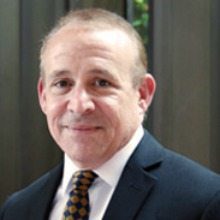
To Tony Crescenzo’s 17-year-old daughter Kate, her dad’s job at IntelliDyne, LLC is to “get other people to do stuff.” The former Marine took on the role of CEO at IntelliDyne in June — a post he ventured into after serving as the COO for the past two years.
“I would say my current role and the role that I’ve played for probably most of my career is creating a trusting team environment where others can do their best work,” Crescenzo said of his current job as CEO. “A CEO’s role is strategic and visionary, while the COO’s role is situational and operational. A CEO works to develop the overarching strategy that meets current business needs while positioning the company for success in the future. The COO then puts the necessary pieces in place to make the strategy a reality on a daily operational level.”
Crescenzo was promoted from COO after the company experienced significant growth with him in that post for two years, according to IntelliDyne, LLC founder Robert Grey.
In a recent interview with WashingtonExec, Crescenzo said his strategic plan for IntelliDyne is to add value to the company’s client base, create an environment where employees can perform efficiently and to support the mission of the federal government.
The IT consulting firm tends to promote from within and invests significant resources mentoring staff to build the pipeline.
“Every executive in the company, every Vice President, every Director has one or more mentees and they are expected to meet with at least once a month to give career advice,” Crescenzo said. “We find that we are able to attract talent from much larger and stronger companies because we have created an environment where we really spend a lot of our time, attention and money on our staff in terms of career mapping, education, training and creating opportunities for people to grow.”
IntelliDyne also has a women’s leadership forum aimed at guiding women in the workforce in their careers. The company differentiates itself through its “culture of accountability” which Crescenzo said holds employees accountable to the clients, in lieu of the management team.Grey in a company press release recently said Crescenzo was known for his individual interactions with his employees, which was atypical for the government contracting market where those onsite do not normally have access to the management sitting at headquarters.
“Tony kind of broke that wall and created an emotional intelligence ecosphere where he listens to both the staff and their supervisors,” Grey said. That’s really what made the culture of accountability breakthrough. He is asking what’s happening in the field, not just what’s happening in the management reports.”
During the interview, Crescenzo also noted that he has an appetite for bad news and uses it as a strategic listening tool to detect early issues and key performance indicators, which has helped him grow the company. “I’m not a real fan of just the good news, I can’t really do anything with it,” Crescenzo said. “It’s great for the staff, but I think one of the things that has helped us grow is our corporate culture where we celebrate the good news and acknowledge and course correct the bad news.”
And the lust for bad news has well served the CEO of the private, mid-tier business in the current “mercenary environment” plagued by budget cuts and the effects of sequestration.
“We are a large business by any measure but we’re certainly not a large business compared to CSC, Booz Allen or CACI,” Crescenzo said. “Those larger businesses are able to drive costs down because they can spread their G&A across a very broad base and are typically more cost competitive than we are, as are small businesses. Smaller businesses obviously have some advantages in terms of competitive advantage over what we do. We really focus on best value and demonstrating how we can serve as trusted advisors to the client, so that our value cannot be solely limited to a matrix of tasks.” He said his company has not found the environment to be too challenging because it works backwards from problems it has solved to anticipate other clients who may struggle with the same problem.
“We’re in that ‘too small to be big’ and ‘too big to be small’ category which requires you to grow as fast as you can and achieve critical mass or you wind up essentially getting the ground from under you taken away,” Crescenzo said. “It’s a very competitive space and a lot of companies get stuck there.”
Whether Crescenzo will let the company get stuck there is doubtful. He leads by example — clocking in the longest hours, minimizing hierarchy and pushing the team mindset.
During his first weeks as CEO, he met with staffers of all levels in order to get to know them as people so as to create an inventory of ideas that could elevate the team’s performance to the next level, he said in the interview.
“There is a difference between extraordinary leadership and ordinary management. Anybody can manage. Management is minimization of deviation from plan,” Crescenzo said. “Leadership is about not only developing a good plan but getting others to adopt that plan as if it was their own.”


